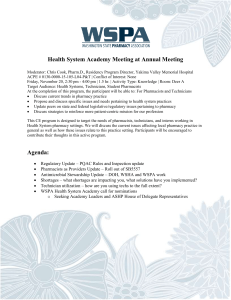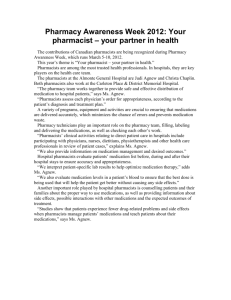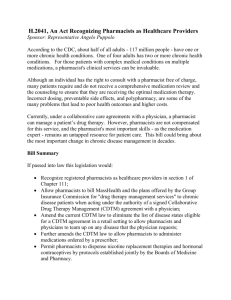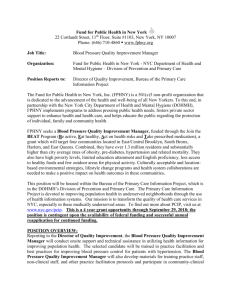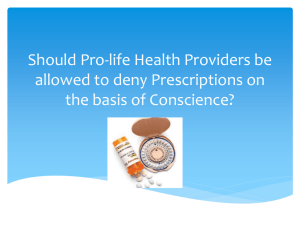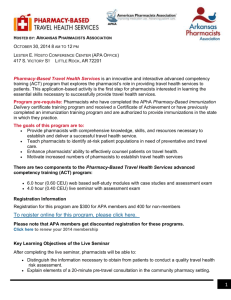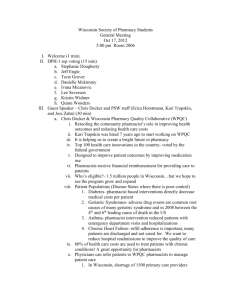October-HUB-2015
advertisement
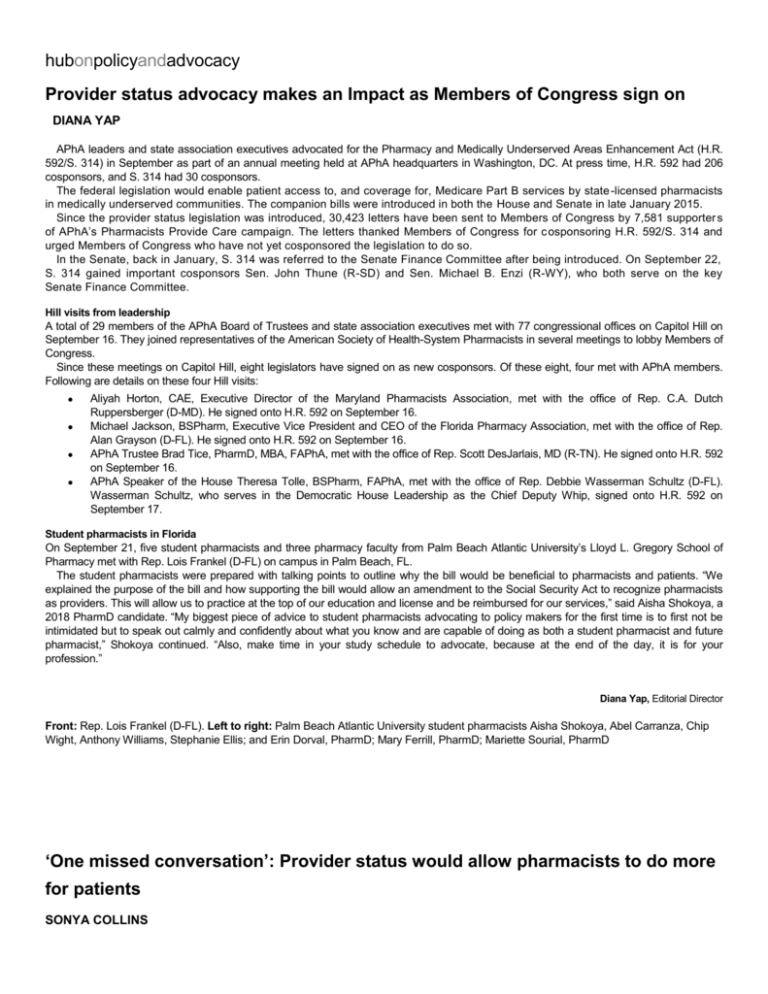
hubonpolicyandadvocacy Provider status advocacy makes an Impact as Members of Congress sign on DIANA YAP APhA leaders and state association executives advocated for the Pharmacy and Medically Underserved Areas Enhancement Act (H.R. 592/S. 314) in September as part of an annual meeting held at APhA headquarters in Washington, DC. At press time, H.R. 592 had 206 cosponsors, and S. 314 had 30 cosponsors. The federal legislation would enable patient access to, and coverage for, Medicare Part B services by state -licensed pharmacists in medically underserved communities. The companion bills were introduced in both the House and Senate in late January 2015. Since the provider status legislation was introduced, 30,423 letters have been sent to Members of Congress by 7,581 supporter s of APhA’s Pharmacists Provide Care campaign. The letters thanked Members of Congress for c osponsoring H.R. 592/S. 314 and urged Members of Congress who have not yet cosponsored the legislation to do so. In the Senate, back in January, S. 314 was referred to the Senate Finance Committee after being introduced. On September 22, S. 314 gained important cosponsors Sen. John Thune (R-SD) and Sen. Michael B. Enzi (R-WY), who both serve on the key Senate Finance Committee. Hill visits from leadership A total of 29 members of the APhA Board of Trustees and state association executives met with 77 congressional offices on Capitol Hill on September 16. They joined representatives of the American Society of Health-System Pharmacists in several meetings to lobby Members of Congress. Since these meetings on Capitol Hill, eight legislators have signed on as new cosponsors. Of these eight, four met with APhA members. Following are details on these four Hill visits: Aliyah Horton, CAE, Executive Director of the Maryland Pharmacists Association, met with the office of Rep. C.A. Dutch Ruppersberger (D-MD). He signed onto H.R. 592 on September 16. Michael Jackson, BSPharm, Executive Vice President and CEO of the Florida Pharmacy Association, met with the office of Rep. Alan Grayson (D-FL). He signed onto H.R. 592 on September 16. APhA Trustee Brad Tice, PharmD, MBA, FAPhA, met with the office of Rep. Scott DesJarlais, MD (R-TN). He signed onto H.R. 592 on September 16. APhA Speaker of the House Theresa Tolle, BSPharm, FAPhA, met with the office of Rep. Debbie Wasserman Schultz (D-FL). Wasserman Schultz, who serves in the Democratic House Leadership as the Chief Deputy Whip, signed onto H.R. 592 on September 17. Student pharmacists in Florida On September 21, five student pharmacists and three pharmacy faculty from Palm Beach Atlantic University’s Lloyd L. Gregory School of Pharmacy met with Rep. Lois Frankel (D-FL) on campus in Palm Beach, FL. The student pharmacists were prepared with talking points to outline why the bill would be beneficial to pharmacists and patients. “We explained the purpose of the bill and how supporting the bill would allow an amendment to the Social Security Act to recognize pharmacists as providers. This will allow us to practice at the top of our education and license and be reimbursed for our services,” said Aisha Shokoya, a 2018 PharmD candidate. “My biggest piece of advice to student pharmacists advocating to policy makers for the first time is to first not be intimidated but to speak out calmly and confidently about what you know and are capable of doing as both a student pharmacist and future pharmacist,” Shokoya continued. “Also, make time in your study schedule to advocate, because at the end of the day, it is for your profession.” Diana Yap, Editorial Director Front: Rep. Lois Frankel (D-FL). Left to right: Palm Beach Atlantic University student pharmacists Aisha Shokoya, Abel Carranza, Chip Wight, Anthony Williams, Stephanie Ellis; and Erin Dorval, PharmD; Mary Ferrill, PharmD; Mariette Sourial, PharmD ‘One missed conversation’: Provider status would allow pharmacists to do more for patients SONYA COLLINS The patient, “Robert,” was taking a lot of medications—most of them for his heart—when Eric Johnson, PharmD, met with him for his annual comprehensive medication review at a Smith’s Pharmacy in Layton, UT. During annual comprehensive medication reviews, Johnson makes sure his patients are taking their medications correctly, that the medications are working appropriately, that patients aren’t experiencing unpleasant adverse effects, and that patients aren’t taking medications they no longer need. Johnson’s patients benefit a great deal from this service. But Johnson wishes he had been able to help Robert sooner. About 6 months before his meeting with Johnson, Robert had a routine visit with his physician. During the visit, the doctor made the offhand comment, “Oh, we’ve reached maximum benefit from your betablocker,” meaning Robert was taking the maximum dose. Robert misunderstood this to mean that he no longer needed to take the betablocker that was used to treat his heart failure. “So the patient stopped taking it, went into heart failure, ended up in the hospital—and almost a million dollars later, came out with a device inside his chest,” said Johnson. Like the other pharmacists profiled in this series, Johnson believes provider status would allow him to do more for patients like Robert. Recognizing pharmacists as providers Provider status allows health professionals to bill patients’ insurance for their services, but payers often do not recognize pharmacists as health care providers. In a community pharmacy, besides the annual comprehensive medication reviews and limited targeted interventions that Medicare Part D covers for select beneficiaries, pharmacists have little opportunity to offer the types of services they are qualified to provide. Insurance reimburses pharmacies for the drugs that pharmacists dispense, but it may not pay pharmacists to continually monitor patients for proper use of those drugs. Robert was stable on his medications before the misunderstanding at the physician’s office. “If pharmacists were more involved with monitoring patients and compensated for that, I would have known the patient hadn’t picked up his medication. I could have notified the doctor, had a conversation with our patient, and saved the health care system about a million bucks. And our patient would have a better quality of life,” said Johnson. But the current business model in most community pharmacies doesn’t allow pharmacists to watch over patients in this way. Robert’s story is not a fluke. In 2012, Annals of Internal Medicine reported that medication nonadherence costs the U.S. health care system up to $289 billion a year. It causes an estimated 10% of hospitalizations and 125,000 deaths in the United States every year. The report suggested that, among other factors, short physician visits and lack of information sharing between pharmacists and physicians could in part be to blame for poor medication adherence. The authors noted that studies have proven that several different types of pharmacist-led interventions can improve adherence. Lost opportunity If pharmacists could sustainably monitor patients’ medication adherence, Johnson would have regular follow-ups with Robert, and he would have had the opportunity to explain to the patient what his physician meant. “Now he’s hooked up to batteries for the rest of his life. By the end of his life, there will be millions of dollars spent on his care—all because of one missed conversation.” Pharmacists today are trained to do much more than the current reimbursement model allows. “Look at the curriculum in pharmacy schools today. We are very prepared. We run anticoagulation clinics, smoking cessation counseling, health screenings, health coaching, vaccine clinics, and much more.” The health care services that pharmacists are qualified to provide can relieve the burden on the primary care workforce, save the health care system billions of dollars, and, most important, save lives. But until more payers recognize pharmacists as health care providers and reimburse them for their services, patients will have to wait. Sonya Collins, MA, MFA, contributing writer Photo Caption: Eric Johnson
